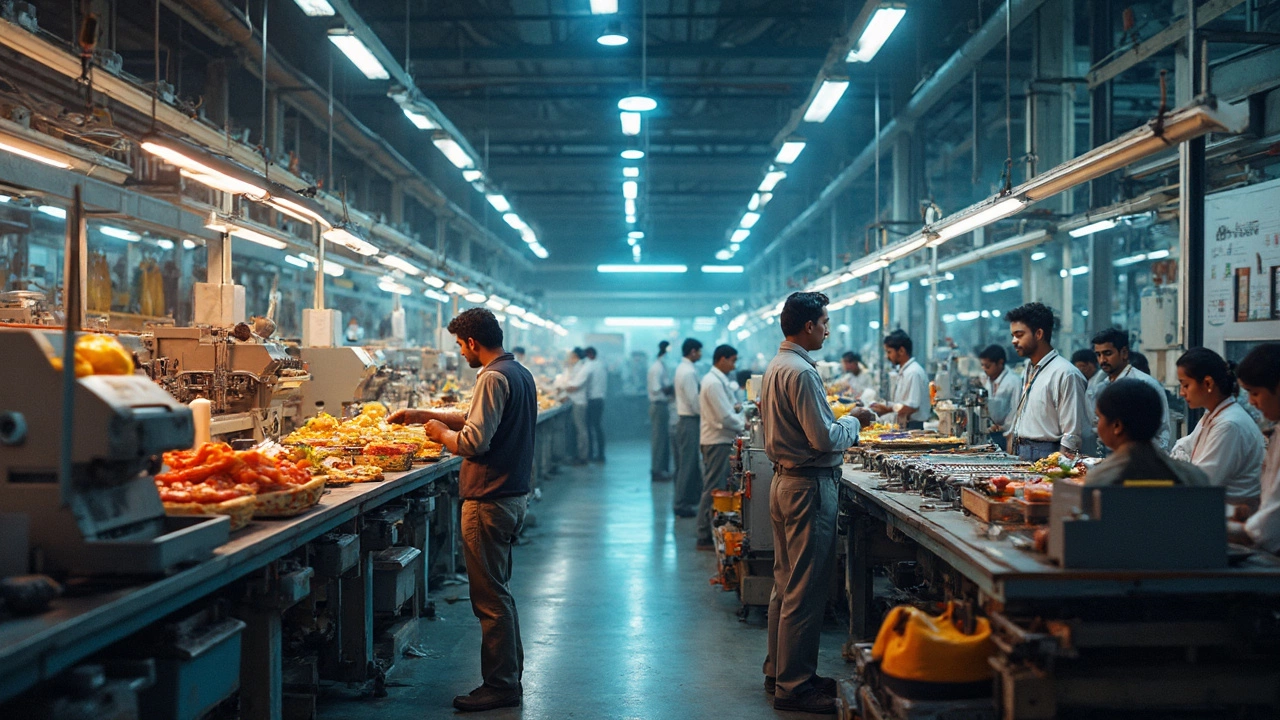Top Profitable Food Processing Units to Invest In

The food processing industry is a vibrant and dynamic sector where new opportunities emerge as consumer behaviors shift and technological innovations take center stage. With the increasing pace of life, many people are leaning towards convenient and healthy eating options. This shift opens up a vast playground for entrepreneurs.
With countless possibilities, it becomes essential to analyze which niches can lead to profitability. From producing plant-based meats to crafting gourmet ready-to-eat meals, understanding consumer desires and industry trends is key. Dive into this realm, armed with knowledge and creativity, and uncover the ways you can thrive in the food processing business.
- Understanding Market Trends
- Popular Food Processing Niches
- High-Demand Products
- Sustainable Practices
- Innovation and Technology
- Tips for Success
Understanding Market Trends
The food processing sector is constantly evolving, shaped by changing consumer preferences, economic shifts, and technological advances. One significant trend is the growing demand for healthy and sustainable food options. As more people become health-conscious, they are seeking out products that not only satisfy hunger but also contribute to overall well-being. This pattern is evident in the booming markets for organic, gluten-free, and plant-based foods. The rise in veganism and vegetarianism, coupled with ethical and environmental concerns, has propelled the plant-based food market to new heights, creating a fertile ground for entrepreneurs in the industry.
Environmental sustainability is another crucial trend influencing food industry strategies. Consumers are increasingly interested in how their food is produced, packaged, and delivered. This has led to a surge in demand for eco-friendly packaging and locally sourced ingredients, aligning with the principles of reducing carbon footprints and supporting local economies. Companies that adapt to these demands, especially small businesses, often find themselves gaining loyalty and market share.
The Harvard Business Review notes, "Consumer interest in the environmental impact of food products is a powerful driver for businesses that are prepared to invest in sustainable practices."
Technological advancements are also reshaping the landscape. Innovations such as precision agriculture, blockchain for supply chain transparency, and IoT in manufacturing have provided new ways to enhance efficiency and transparency. These technologies help companies meet consumer demands while optimizing production processes. Entrepreneurs looking to enter the food processing market must stay abreast of these technological developments, as they often set the groundwork for competitive advantages.
Additionally, there's a notable shift towards convenience. With hectic lifestyles, consumers prefer ready-to-eat meals, snackable portions, and easy-to-prepare kits. These products cater to the need for quick meal solutions without compromising on taste or nutrition. Understanding these preferences is critical when deciding on the type of food processing venture to embark upon.
By recognizing and adapting to these trends, businesses can align their strategies with market demands and secure a competitive edge in the food industry. Entrepreneurs should consider investing in consumer research and trend analysis tools, as these provide valuable insights that can drive product innovation and marketing strategies. The key to success is staying informed and agile, ready to pivot with the fluid dynamics of consumer expectations and market requirements.
| Trend | Market Impact |
|---|---|
| Health-Conscious Eating | Increased demand for organic and plant-based products |
| Environmental Sustainability | Focus on eco-friendly packaging and sourcing |
| Technological Innovations | Enhanced efficiency and transparency in production |
Popular Food Processing Niches
In the bustling arena of the food processing industry, specific niches stand out due to their capacity to meet contemporary consumer demands and their potential for high returns. With health, convenience, and sustainability becoming primary concerns, businesses that cater to these needs are flourishing. One of the leading niches is the production of plant-based products. As people become more health-conscious and environmentally aware, the demand for plant-based alternatives to traditional meat and dairy products continues to rise. These products not only appeal to vegetarians and vegans but also to flexitarians who are seeking to reduce their meat consumption for health or ecological reasons. Research from the Good Food Institute indicates that the plant-based food sector has seen a growth rate of 27% over the past two years, reflecting strong consumer interest.
Another promising niche is the ready-to-eat meal sector. People today often struggle to balance their busy schedules with the desire for nutritious meals, leading to a burgeoning demand for convenient, high-quality options. Companies that can create meals which blend taste, nutrition, and convenience tend to see great success. For instance, frozen produce and gourmet meal kits now occupy an important space in supermarkets across major urban areas. In fact, statistics from Grand View Research predict that the global ready meals market will grow from $219 billion in 2020 to over $285 billion by 2028.
A rapidly evolving area is ethnic and specialty foods. As globalization brings cultures closer, there has been an increased appetite for diverse and authentic culinary experiences. By tapping into this market, businesses can cater to a wide audience. For instance, the popularity of Asian cuisine like sushi and Korean barbecue has led to new ventures focused on delivering these foods in ready-to-eat formats. According to the Specialty Food Association, the specialty food market grew by 10.7% over the past year, spotlighting the vast potential within this niche.
Additionally, with the growing emphasis on health, functional beverages and fortified foods have carved out a robust place in the food processing realm. These products serve the dual purpose of satisfying thirst and providing nutritional benefits, often targeting specific health concerns. Kombucha, a fermented drink believed to aid digestion, and protein-packed beverages for gym enthusiasts are capturing increasing market share. According to a report by Market Data Forecast, the functional beverages market will likely experience a compound annual growth rate of 6.8% over the next five years, suggesting a favorable climate for businesses entering this arena.
But profitability isn't just about following trends. It's also about innovation. As expressed by food entrepreneur Sarah Blakely,
"Innovation isn't just creating something new; it's improving and transforming the existing."This quote hints at the exciting possibilities within the intersection of traditional methods and modern technologies. Exploring areas like food waste solutions or developing new methods for food preservation can uncover remarkable opportunities. Entrepreneurs who dare to explore and expand these promising niches are well-positioned to enjoy sustainable and rewarding careers in the food industry.

High-Demand Products
The food processing industry is filled with potential niches, but identifying high-demand products can significantly impact profitability. One such booming segment is plant-based foods. With a surge in vegan and vegetarian lifestyles, even meat-eaters are embracing these alternatives for health or environmental reasons. Products like plant-based burgers, dairy-free cheeses, and egg substitutes have captured the market's interest. This trend isn't just a passing phase; it reflects a bigger shift, where sustainability plays a crucial role in consumer choices.
Ready-to-eat meals are also gaining remarkable traction. As urban populations grow busier, the convenience of having meals that require minimal preparation is a major selling point. These aren't just any meals, but high-quality, nutritious options that cater to diverse dietary needs, from gluten-free to keto. A study published by the Specialty Food Association highlighted that the market for ready-to-eat meals in the US is expected to grow by around 6% annually, indicating robust demand.
Another strong contender in the arena of food processing is organic products. As the public becomes more health-conscious, there’s a pronounced shift towards clean-label foods. Organic snacks, cereals, and beverages offer an alluring prospect to consumers wary of artificial additives. A report from Statista noted that the organic food market was valued at over $120 billion worldwide and is only expected to grow. This signals a ripe opportunity for entrepreneurs aiming to tap into the health-conscious demographic.
Functional foods and beverages, which offer health benefits beyond basic nutrition, present another promising growth avenue. These could range from protein-enriched energy bars to probiotic-rich yogurts. A recent survey by NielsenIQ found that 79% of consumers are actively trying to improve their health through food choices, highlighting an inclination towards fortified products. Such foods not only target health benefits but also appeal to athletes, health enthusiasts, and regular consumers looking to stay fit and active.
“The future of food processing lies significantly in the innovation of products that meet the lifestyle needs of the modern consumer,” says Rana Gurjar, renowned for his insights at the Food Innovation Summit. This statement underscores the necessity to remain creative and adaptable as trends evolve. Personalization in products is also a next-generation approach. Some companies are already offering customizable nutritional solutions to cater to unique dietary requirements, which opens up new business models and consumer engagement strategies.
Sustainable Practices
Sustainability in the food processing industry is not just a buzzword—it's a critical commitment that companies make to ensure a healthier planet and a more efficient business model. As consumers become increasingly conscious of their environmental impact, adopting sustainable practices can significantly drive a food company's profitability and reputation. One of the cornerstones of sustainable practices is reducing waste. Food processing units can tackle waste by implementing efficient supply chain management, reusing by-products creatively, and enhancing packaging technology to protect and preserve food longer.
Another powerful tool in the quest for sustainability is the use of renewable energy sources. Many companies are turning to solar panels and wind energy to minimize their carbon footprint. A facility that operates on green energy not only cuts costs in the long run but also appeals to environmentally-friendly consumers. Water conservation is another essential area where processors can make a significant difference. Recycling water within the plant for non-potable use and reducing the overall water consumption through efficient processing techniques can create substantial environmental benefits.
"Sustainable practices in food processing not only help in preserving natural resources but also enhance operational efficiency," states John Elkington, a pioneer in the field of sustainability.
Technology and Innovation
The integration of cutting-edge technology plays a crucial role in the food industry’s sustainability efforts. Advanced processing technologies such as high-pressure processing (HPP) and pulsed electric fields (PEF) have made it possible to improve food safety and extend product shelf lives without compromising nutritional value. These technologies can reduce energy consumption, create less waste, and maintain product quality, ultimately contributing to a more sustainable operation. Engaging with technology-driven farming methods such as vertical farming and aquaponics can also support a consistent supply of raw materials while maintaining ecological balance.
Investing in sustainable partnerships and certifications can strengthen a company's commitment to sustainable practices. Collaborating with suppliers who share similar eco-friendly values ensures that the entire supply chain is aligned towards minimizing environmental impact. Certifications such as LEED for facilities and Rainforest Alliance for sourcing can add credibility to a company's initiatives, making it an attractive option for conscious consumers. In addition, transparency and honest communication about sustainability efforts through clear labeling and marketing empower consumers to make informed choices, further boosting a food processing unit's sustainability-driven burgeoning success.

Innovation and Technology
In the constantly evolving landscape of the food processing industry, innovation and technology stand at the forefront, driving transformations that were unimaginable just a few years ago. This technological revolution holds incredible promise for increasing efficiency, enhancing food safety, and creating new high-demand products that cater to ever-changing consumer tastes. Automation, for instance, has been a game-changer, allowing firms to increase output without sacrificing quality. Robotics in packaging and sorting not only streamline processes but also reduce costs significantly.
Cutting-edge technologies such as blockchain and Internet of Things (IoT) have extended their reach into the realm of food safety and traceability, creating a more transparent supply chain. This increased visibility ensures that the journey of each product, from farm to table, is easily traceable, which is crucial for maintaining safety standards and instilling customer confidence. A survey by Deloitte reported that 64% of consumers are willing to pay more for products with verified traceability – a statistic that underscores the importance of these technologies in gaining a market edge.
Opportunities Through Emerging Technologies
Artificial intelligence (AI) offers new ways to gain insights into consumer preferences and adapt quickly to market needs, thereby boosting profitability. AI-driven analytics allow businesses to predict market trends, optimize supply chains, and customize food offerings more effectively. For example, some startups are using machine learning algorithms to study massive datasets, aiming to perfect the taste and texture of plant-based meats, catering to the rapidly rising vegan demographic.Daphne Chan, a food tech expert, noted, "The future of food processing isn’t just about what we produce but how efficiently and sustainably we can bring innovation to the table."Additionally, 3D food printing is emerging as a revolutionary force, enabling the production of custom food designs and textures that were previously impossible. This technology could soon play a major role in specialized nutrition and dietary-specific food production.
Innovation aligned with sustainability trends is another critical area. With consumers increasingly opting for eco-friendly options, businesses focusing on renewable resources and waste reduction are positioned for long-term success. The use of biodegradable packaging materials and the implementation of circular economy models are not just good for the planet but also resonate strongly with environmentally conscious buyers. By transforming food waste into energy or new food products, processing units can significantly decrease their environmental footprint while opening up additional revenue streams.
These technologies and innovations are not just transforming the food processing landscape but are setting new benchmarks for what is possible in the industry. By embracing these changes, companies can not only improve their operational efficiencies but also pave the way for new product offerings that meet the nuanced demands of modern consumers. As technology continues to advance, the possibilities are boundless, and those who stay ahead of the curve will reap the rewards.
Tips for Success
In the bustling landscape of food processing, success often hinges on a mix of strategic planning, relentless innovation, and a keen eye on consumer trends. The first step towards success in this industry is to deeply understand your target market. Conduct thorough research to know what consumers want today and anticipate what they might need tomorrow. This could involve studying demographic shifts, health trends, and spending behaviors to tailor your products accordingly. Staying ahead in predicting these needs will help distinguish your brand and ensure customer loyalty. The knowledge you gain from this research should inform everything from the types of products you offer to your branding and marketing strategies.
Another pillar of success lies in efficiency and sustainability. With growing awareness around environmental issues, incorporating sustainable practices into your food processing business can both appeal to eco-conscious consumers and improve your margins. Consider investing in energy-efficient machinery or implementing waste-reduction protocols. Not only does this save on costs in the long term, but it also positions your brand as one that values corporate responsibility. As noted in a recent Forbes article, "Businesses that lead with values and corporate social responsibility generate more loyalty and trust among their stakeholders." This trust is invaluable in gaining a loyal customer base.
Implementing Technology
Modern technology plays a critical role in the food processing industry, acting as a catalyst for quality improvement and productivity enhancements. Automation, AI, and blockchain are not just buzzwords; they are tools that can transform your business operations. AI can help streamline your supply chain, reduce errors and waste, and ensure consistently high-quality products. Meanwhile, blockchain technology can offer transparency in sourcing, which is increasingly important to consumers who prioritize ethical consumption. Integrating these technologies can enhance your food industry business's efficiency significantly, though it requires an upfront investment.Networking and Partnerships
Forging strong partnerships within the food processing industry can provide an additional rung on the ladder to success. These relationships could be with suppliers, distributors, or even complementary businesses. Strong networks can enhance your business reputation, assist in overcoming industry challenges, and open doors for collaborative opportunities. Take advantage of industry events, trade shows, and local business groups to create and maintain valuable connections. Such efforts can lead to shared resources, better supplier rates, and even joint marketing ventures.Lastly, maintaining a strong commitment to quality and consistency is crucial. Your reputation is built on your customers' experiences with your product. Consistent quality assurance processes can help ensure that you meet or exceed expectations every time. This commitment to quality not only fosters trust but also differentiates your products in a crowded market. Keep innovating, keep improving, and watch your food processing business thrive in the competitive landscape.





